Log In
Remember meForgot password?
Forgot Password?
Election
They’ll tell you not to use voiceover in your screenplay. They’ll tell you that voiceover is a crutch for writers who can’t handle visual exposition, that voiceover “tells” when film should “show,” that voiceover is redundant and a cheap gimmick for covering up holes in a plot. They’ve been spending too much time with that first version of Blade Runner and not enough with Sunset Boulevard.
Also: Election. Oh, man, Election. I love this movie.
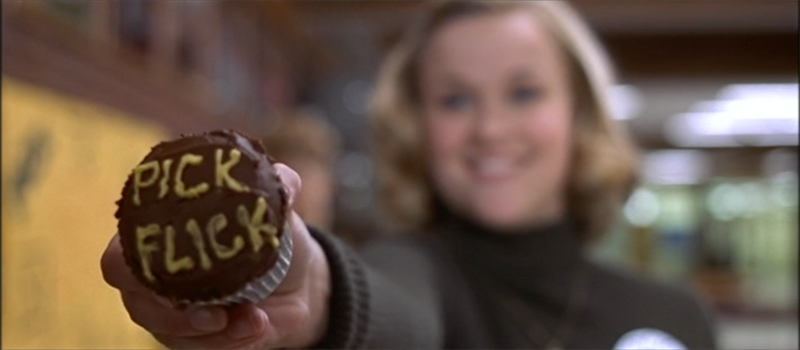
For the newcomers, Election is the story of overachieving high school student Tracy Flick and the teacher who attempts to thwart her dreams—or as Tracy puts it, her destiny. The plot interweaves the narration of four characters, each coming at events from their own unique perspective. In addition to Tracy, there’s Mr. McAllister, the teacher; Paul Metzler, the genuinely nice idiot quarterback; and Paul’s “not a lesbian” sister, Tammy.
Love her or hate her, Tracy Flick is iconic. We all knew a Tracy Flick in high school. Some of us maybe were Tracy Flick.
Oh, and there’s one more thing you should know about Tracy—

The story is narrated in turns by these four main characters, and this voiceover narration gives the film its distinctive heart and humor. There’s such delicious irony as they tell us their various versions of the truth, putting themselves in the best possible light, while the action on screen counters their words to reveal how self-deluded they all really are.
INT. MILLARD YEARBOOK OFFICE — DAY
A DOOR with cloudy glass and a stenciled sign: YEARBOOK OFFICE.
DISSOLVE through the door and TRAVEL through an empty room to discover another door with a sign that reads DARKROOM.
TRACY (V.O.)
Since I grew up without a dad, you might assume psychologically I was looking for a father figure.
DISSOLVE through the darkroom door to —
DAVE AND TRACY bathed in red light. Tracy is sitting on Dave's lap as they make out hungrily.
TRACY (V.O.)
But that had nothing to do with it at all. It was just that Dave was so strong and made me feel so safe and protected.
My Mom always tells me I'm different—you know, special.
“Story experts” will tell us that when using voiceover narration in your film, you should still be able to understand the story even if the voiceover were to be removed. I’m not sure that’s true with Election—or maybe you could understand it, but you’d miss out on so much nuance and character motivation that the movie wouldn’t be worth watching.
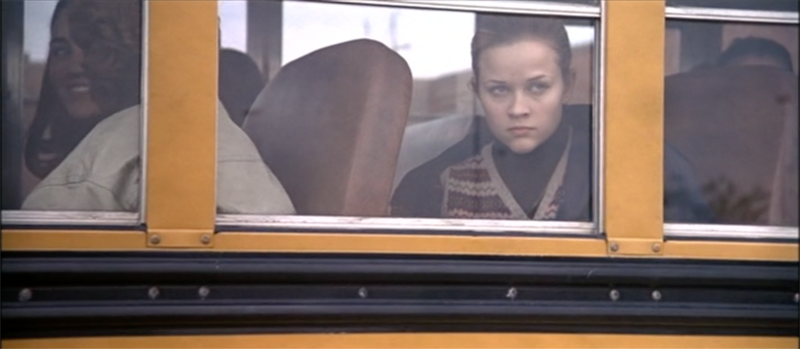
Structurally, once again we see three basic acts featuring setup, conflict, and resolution. A bit past eight minutes into the movie we get one of the greatest inciting incidents of all time, the "one more thing you should know about Tracy" scene. It's this revelation of Tracy's affair with Dave Novotny that drives Mr. McAllister's unease around her, leading him to coax Paul into running for president. And then there's a solid midpoint that turns Mr. McAllister's life upside down (when he helps Linda with her "plumbing problem"), resulting in the reckless despair and anger that allow him to throw the election in the third act.
I don't know why, but Lisa decided she wanted to hurt me, and she knew exactly what to do.

One of the great things about Election is how effortlessly it unites the stories of four very different people, each with very different goals. Tracy runs for school president because she believes it's her destiny, part of her big plan for greatness. She's ambitious, self-righteous, and ruthless when threatened. Mr. McAllister, with personal problems at home, can't seem to take the concerns of his students seriously—and his animosity toward Tracy is driven at least in part by his repressed desire for her. Paul runs for president only reluctantly, at Mr. McAllister's urging, and genuinely wants the best for everyone involved. He remains consistently oblivious to everyone else's underhandedness. Tammy, who couldn't care less about the election, runs for president to get back at ex-girlfriend Lisa—and in a great plot twist she uses the evidence of Tracy's vandalism not against Tracy but to get herself expelled and transferred to an all-girl school. Everybody wins!
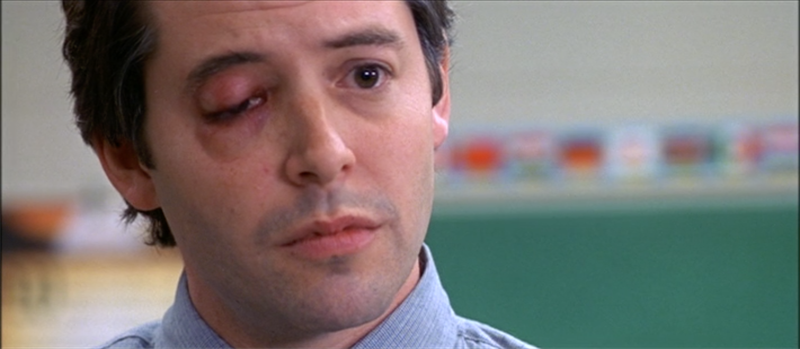
Well, maybe not everybody. Adult Ferris pretty much gets what he deserves. His fling with Linda invites a rapid cascade of insult upon injury. He gets stood up, stung by a bee, ratted out to his wife, and kicked out of his house all in one afternoon. He spends the night in a car then has to move into a motel where he loses a fight with a vending machine. He gets caught throwing a high school election, loses his job, and goes viral with his shame. His wife divorces him. Former students spit at him. And it all results directly from his own actions. Let that be a lesson to you!
(The lesson I'm talking about, of course, is not that you shouldn't cheat on your partner or rig elections, but that if you're a storyteller you should take care that actions arise from character and have consequences, that payoffs are set up, that events don't randomly occur just because things are getting boring.)
Mr. McAllister (V.O.)
I’ll never know if she saw me. Probably not. But in that moment, all the bad memories, all the things I’d ever wanted to say to her, it all came flooding back. My first impulse was to run over there, pound on her window, and demand that she admit she tore down those posters, and lied and cheated her way into winning that election. But instead, I just stood there. And I suddenly realized I wasn’t angry at her anymore. I just felt sorry for her. I mean when I think about my new life, and all the exciting things I’m doing, and then I think about what her life must be like, probably still getting up at five in the morning to pursue her pathetic little dreams. It just makes me sad. I mean where is she really trying to get to anyway? And what is she doing in that limo? Who the fuck does she think she is?
What's the difference between morals and ethics, anyway?
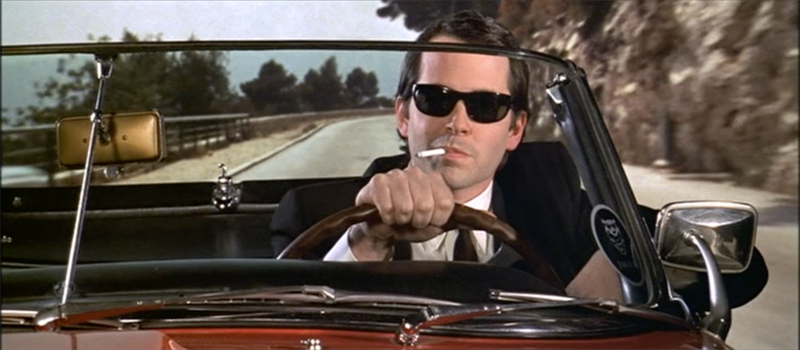
Double Feature Suggestion
- In Election we see the truth on the screen even as our narrators put their own not-always-honest spin on events. Contrast that technique with the grandfather of all unreliable-narrator-films, Rashomon, where the truth becomes almost beside the point as we see and hear four very different versions of the same tale. This one is a must-watch for all serious students of film and storytelling.
Screenplay Link
- For a movie as great as Election, it's instructive that even in the third draft of the screenplay the writers had not yet found what seems now to be such an obvious, perfect ending. They were still trying to shoehorn in a happy conclusion (presumably from the source material) where Mr. McAllister gets back together with Diane, finds a new job, and even reconciles with Tracy. It all seems forced and not at all true to the tone of the story or the capabilities—the "destinies," even—of these characters. They even went as far as filming this awful, early take. If you're a masochist you can find a rough cut of it on YouTube.
That’s what’s great about America: You can always start over.
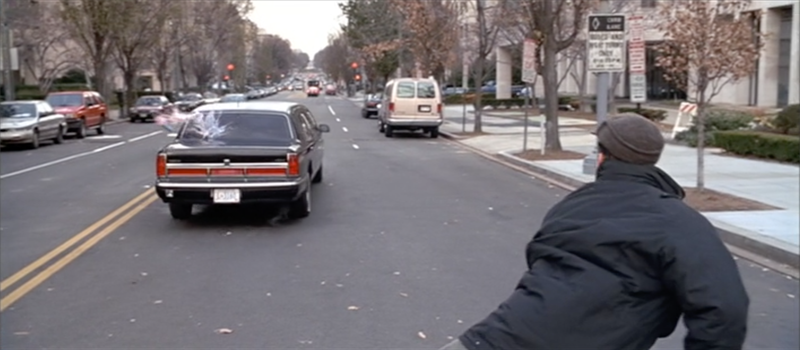
Comments
Join to Comment
or
<< John Wick << >> Casablanca >>
If you died right now, I would throw myself into one of my dad's cement trucks and get poured into your tomb.

My Books
Recent Posts
- Before Sunrise
- Pulp Fiction
- Moonrise Kingdom
- Party Down
- Eternal Sunshine of the Spotless Mind
- The Limey
- La La Land
- The Apartment
- Kiss Kiss Bang Bang
- John Wick
- Election
- Casablanca
Story Circle Notebooks
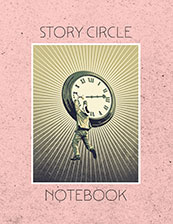
| 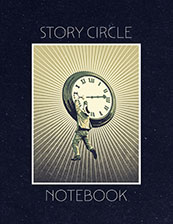
|
These notebooks contain story circle templates and blank dot-grid pages that are great for breaking down your own creations or analyzing the structure of existing films and stories. Purchase from Amazon:
Help Me Choose
What movie should I write about next? I have a few ideas, but I‘m open to suggestions:
CatsChildren Of Men
Donnie Darko
Four Weddings and a Funeral
Good Will Hunting
Grosse Point Blank
Hell or High Water
Jo Jo Rabbit
La Dolce Vita
La Notte
Logan
Miller's Crossing
Moonlight (2016)
Never Let Me Go
Pan's Labyrinth
Punch Drunk Love
Rambo
Star Wars
The Big Lebowski
The Nice Guys
The Raid 2
or something else
Vote Results for Upcoming Posts
Thank you for your suggestion! Be sure to sign up below to be notified when new story circles are posted to the site!
Pan's Labyrinth (14%)
Donnie Darko (12%)
Star Wars (11%)
Jo Jo Rabbit (8%)
The Big Lebowski (7%)
Punch Drunk Love (7%)
Children Of Men (6%)
Good Will Hunting (5%)
Hell or High Water (5%)
Other
Thanks again! And hey, if you’d like to write one of these articles, hit me up.
Write for Story24
If you’re interested in contributing to this site, I would love to hear from you. Learn more here:
Other Business
Some of the links on this site are affiliate links. I earn a small commission when purchases are made after these links are clicked.


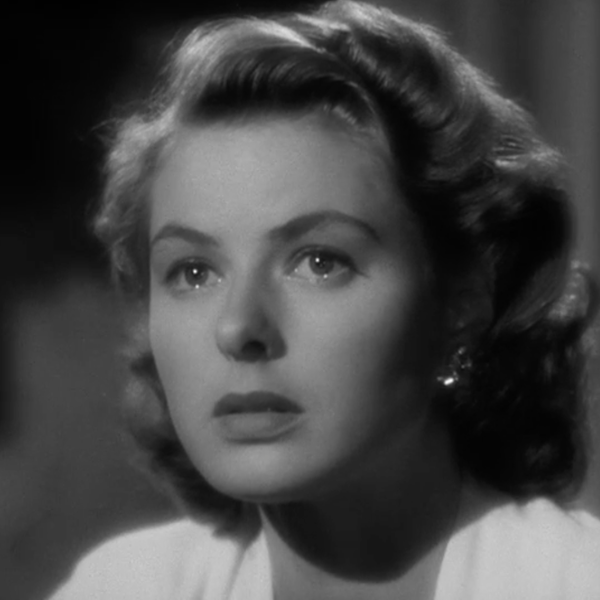



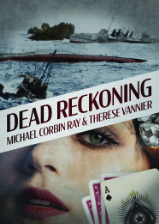
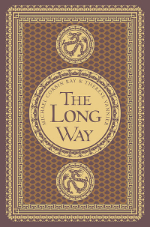
No comments yet.